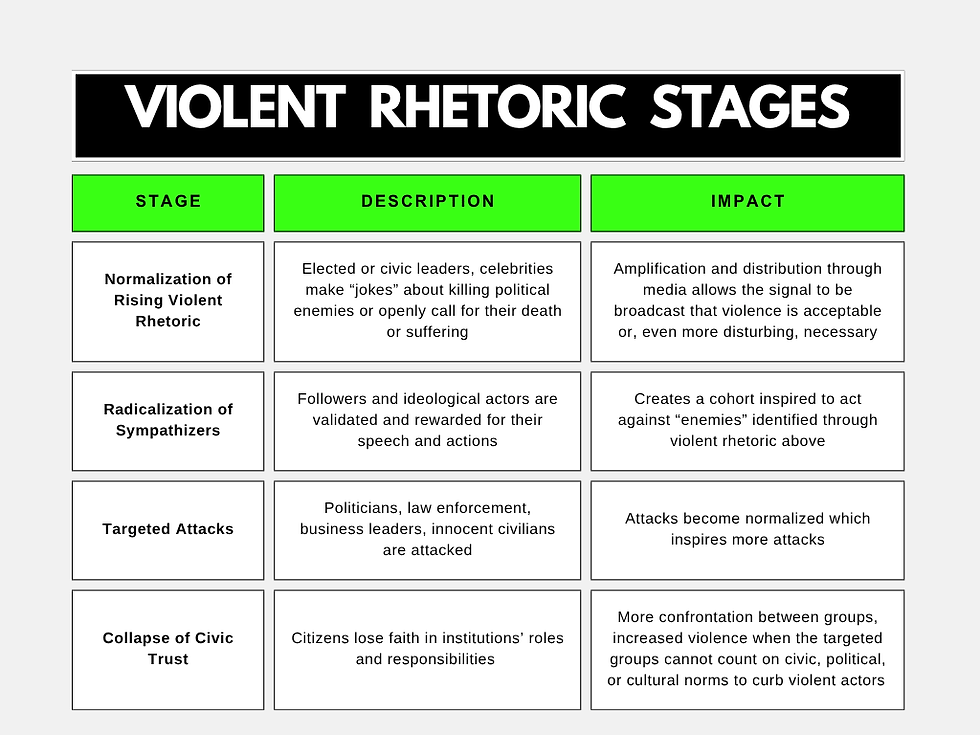What South Africans Know About Surviving Collapse — And What Americans Must Learn Fast
- Brad Parker

- Sep 22, 2025
- 4 min read
“South Africa isn’t a different world anymore. It’s a glimpse into our near future — if we’re not prepared.”

A Preview of Our Future?
Assassinations
Cold-blooded murder on the streets and public transport
Home invasions
Carjackings
Arson attacks on homes and businesses
These are not isolated tragedies. They’re warning flares. The America we knew is shifting. Institutions are faltering. Protection is increasingly a personal responsibility.
That may sound bleak, but it’s not new.
Just look to South Africa.
A nation once admired for its beauty and potential is now fractured by corruption, collapsing public services, and widespread violence. The shocking part? The strategies South Africans have developed to survive are increasingly relevant here.
At TSG Defense, we train to increase our abilities and performance for self-defense and the defense of others.
And what we’re seeing now is simple:
America is becoming South Africa, one broken city at a time.
The South African Mirror: What Happens When Institutions Fail
In many areas of South Africa, the police don’t come. The courts can’t be trusted. Even basic services like water, power, and emergency response have become luxuries. In response, law-abiding South Africans don’t just own guns — they build fortified homes, hire private security, and most critically, build resilient communities to fill the gap.
They live under what some call “low-grade war” conditions.And they survive. So what can Americans learn — before things get worse?
Four Critical Self-Defense Lessons for American Families
1. Firearms Are Essential — But Not Enough
If your entire plan for personal protection is “I’ll just shoot them,” you’re not ready.
Firearms are powerful tools, but without proper training, legal preparation, and defensive layers (think: safe room, external lighting, alarms, and perimeter fortifications), that tool may become a legal nightmare — or a death sentence.
We train with live-fire scenarios, stress drills, and decision-making under pressure. Why? Because in a real attack, your gear won’t save you. Your will and physicality are your superpowers.
Keypoint: Train for the fight, but also train to avoid it.
2. Your Zip Code May Be the Most Important Security Choice You Make
South Africans have learned that location is everything.The safest homes are in jurisdictions that respect self-defense, support law enforcement, and prioritize order over chaos.
The same applies here in the U.S.
If you live in a jurisdiction where DAs prosecute defenders instead of criminals, you must reconsider your family’s long-term safety strategy. Moving to a safer state, county, or community isn’t cowardice. It’s survival planning.
3. Private Security and Defensive Design Work — When Public Safety Fails
South Africa now has over 2.7 million private security workers, dwarfing the number of police.
These teams patrol, monitor, and respond — because no one else will.
Here in the U.S., we’re seeing similar gaps. Whether it’s a gated estate in Malibu or a rural ranch in Texas, families are turning to trained private protection to bridge the divide.
The reality? Private solutions are now public necessity.
Real‑World Examples of Private Security / Individuals Saving Lives
In New Orleans, in the aftermath of Hurricane Katrina, wealthy property owners hired private security firms—including Blackwater—to guard their homes from looters and violence when public law enforcement was overwhelmed. These guards, armed and organized, performed patrols through lawless neighborhoods, deterred looters, and protected property. Their presence alone prevented many break‑ins and thefts that otherwise would have devastated unprotected homes.
In Johannesburg (and other suburbs), private security firms are not merely decorative: they are actively involved in crime‐suppression. One example (from AP) describes a company led by a former police officer that tracks and recovers hijacked or stolen vehicles. On one recent patrol, this firm and its agents apprehended suspects (driving a vehicle linked to burglaries/armed robbery) and handed them over to police.
Also in recent times, there have been shootouts involving private security guards in South Africa. For example, in Umhlanga (KwaZulu‑Natal), security guards were ambushed by gunmen, and a wild shootout ensued. The private security guards defended themselves and maintained control, preventing the attackers from taking over or doing further harm.
4. Fortify First. Fight If You Must.
South African homes look more like modern castles:
Concrete walls
Electric fences
Steel gates
Dogs, cameras, and panic rooms
Alarm systems tied to rapid-response security units
Why?
Because engagement is always the last resort.Every layer is designed to deter, delay, and survive the attack — not glorify violence.
Defensive design beats reactive heroism every time.
From Awareness to Action: What You Should Do Next
You don’t need to panic. But you do need to prepare. Here’s where to start:
Home Defense Audit
Assess doors, windows, lighting, alarms, landscaping
Build layers from perimeter to core
Jurisdiction Check
Research your DA, your sheriff, and your self-defense laws
Relocate if necessary. This is not paranoia — it’s planning
Professional Training
Go beyond static shooting. Practice movement, judgment, surprise
Learn scenario-based responses for carjackings, home invasions, ambushes
Train for the typical engagement range
Look for reputable firms like PFC Training for real-world skills.
Join or Form a Trusted Network
Family, neighbors, or vetted community members
Coordinate communication and emergency plans
Consider Private Security Consultation
Residential patrols, offsite monitoring, high-risk transport
Final Thought: The South African Crystal Ball for Our Self-Defense
“Only the prepared survive. The rest are statistics.”
America as a country is not South Africa yet — but some cities already are.South Africans didn’t choose to become experts in survival. They had no choice.
We still have one.
Let’s learn from their hard lessons, build smarter, train harder, and refuse to be defenseless.



Comments